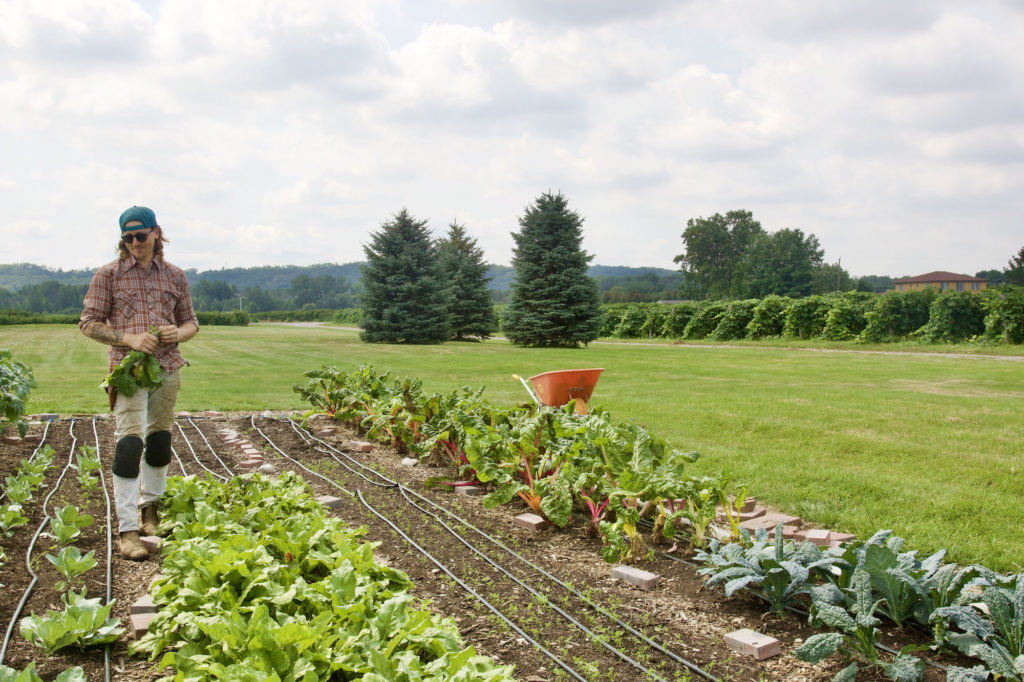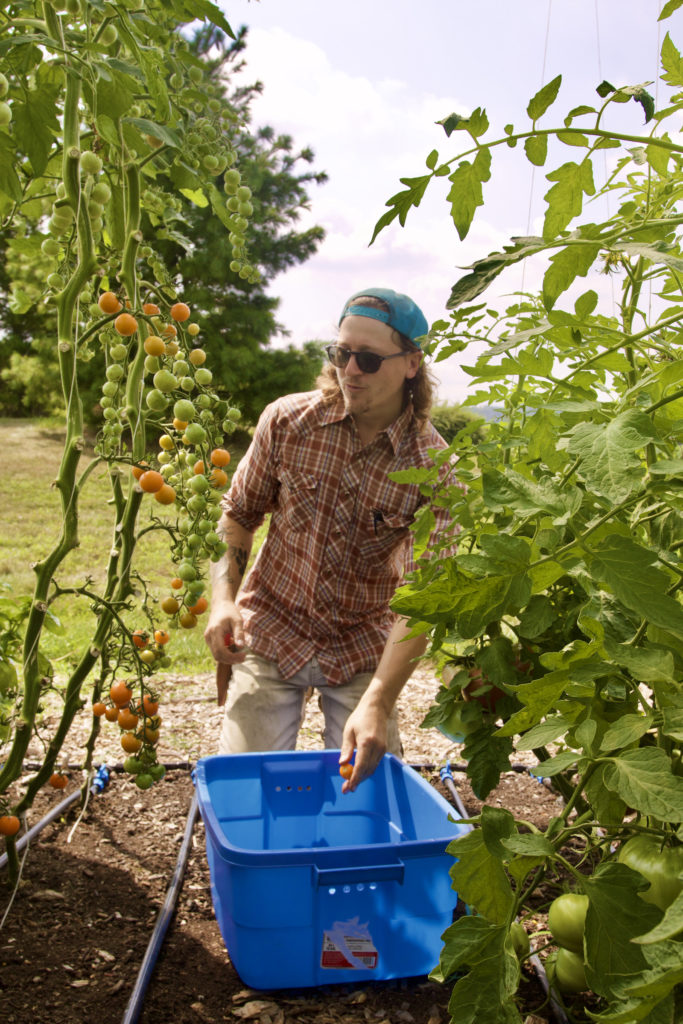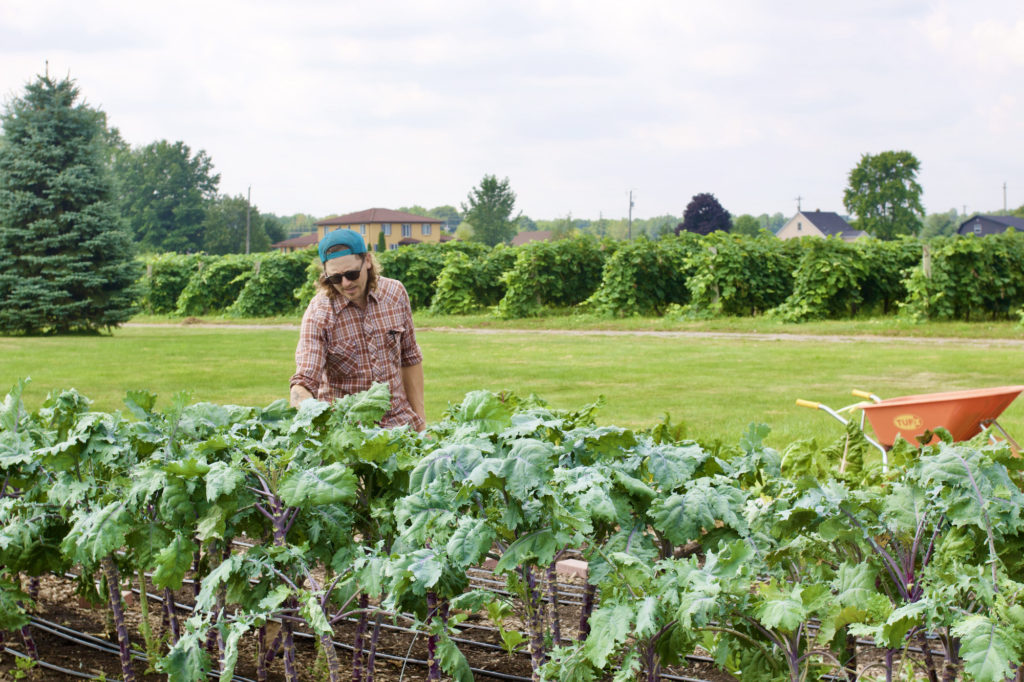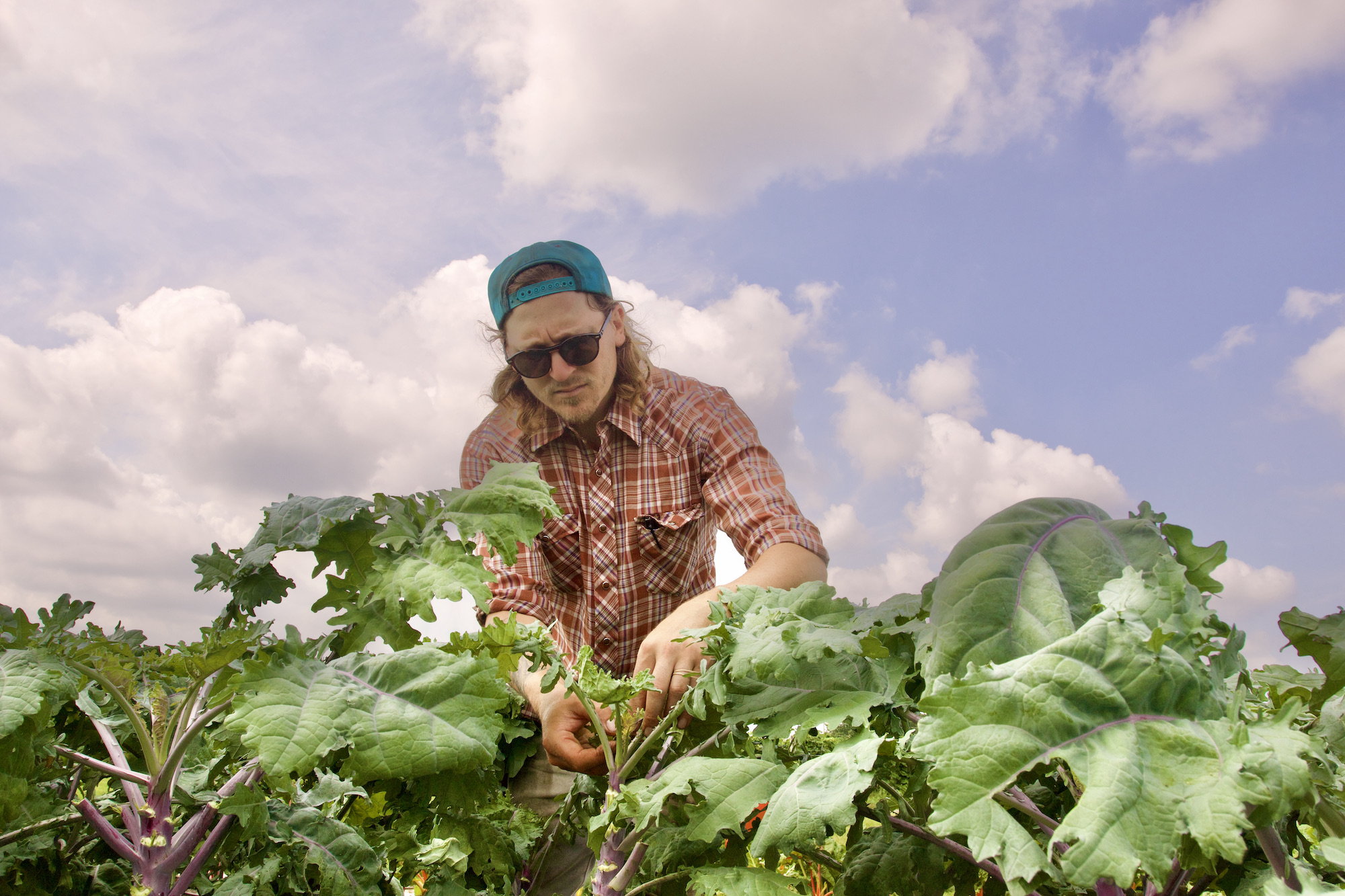Evan Hadley bends down and touches a patch of topsoil in a way that’s one part praising — or protective — parent and one part show of gratitude.
It’s a rare blank space in a swath of vegetables he cultivates in the backyard of a Niagara-on-the-Lake couple; the vacancy waiting to be filled after already producing one crop this summer.
When Hadley, a graduate of Niagara College’s Horticulture Technician program, does plant something there, he’ll do it with minimal disturbance to that topsoil. And whatever Hadley grows in that particular section of his market garden filled with tomatoes, kale, chard, beets, leeks and — his favourite — garlic, it won’t be helped along with anything but compost and Hadley’s elbow grease.
It’s traditional farming, he notes, even if the setup of his small-scale urban farm, Grumpy’s Greens, is anything but conventional. Hadley reclaims lawns, including one in St. Catharines’ Western Hill neighbourhood where he lives, for food production.
“It’s become more and more evident the way we’re doing things isn’t working. Large-scale farming isn’t working,” Hadley says. “It really grinds my gears when I hear traditional farming described as being practised with tractors, heavy tilling and synthetic fertilizers. That’s only been the last 100 years. Traditional farming is being in tune with nature and breaking down organic matter and spreading it where you want to grow.
“There are a lot of corporations trying to convince people you can’t farm another way,” he adds. “But it’s entirely possible. You have to pull up your socks and do the work.”

Growing a better food system
The technical term for the work Hadley does is regenerative organic agriculture. It’s farming where soil health is paramount, forgoing tilling, heavy machinery and chemicals in favour of cover crops and biodiversity. The 1,000-metre view is that it promotes healthy soil that will provide nutrient-dense food for healthier people.
The concept was coined by The Rodale Institute, a U.S. non-profit that studies organic farming. But unlike most organic farming, regenerative agriculture isn’t about maintaining resources. It’s about improving them. Research by Rodale shows that land farmed using regenerative methods can capture enough carbon to not only halt climate change but to reverse it.
The one-metre view at Hadley’s year-old venture is that this approach to food production is taking resource-intensive lawns — currently adding up to one-eighth of an acre between Grumpy Greens’ two locations — and using them nourish one man’s goal of making a living that makes the world a better place.
“There are so many problems in the world with how we produce and consume food,” Hadley says. “I wanted to be the change I wanted to see.”
He doesn’t say that to romanticize his work. If anything, he actively discourages anyone from looking at farming idealistically or naively. It’s hard work, especially juggling two gardens that supply a small CSA, the St. Catharines Farmers Markets on Saturday mornings, and select restaurants, including Dispatch in St. Catharines.
He’ll never make millions, he says. But he’s outdoors where he wants to be, even on the hottest summer days, sometimes wearing long johns when the rest of us are putting on shorts.
There are other joys, too.

The joy of farming
“It’s so satisfying knowing how many meals my food has been part of for so many families and that’s a nice feeling,” Hadley says.
It was 2016 when Hadley enrolled at NC. The Thunder Bay native was 30 years old and had already had a careers in Toronto in entertainment and fine-dining. The latter, where he worked front and back of house, meant Hadley was privy to the care chefs put into sourcing ingredients. It fuelled his love of food and eventually inspired Hadley to produce the edible muses that comprise a menu rather than continue as the server bringing them to someone’s table.
“Seeing it and the way it looks on the plate… seeing chefs change the menu through the season, absorbing that — the whole restaurant industry is fun but I didn’t want to wake up at 40 and be one of those alcoholic servers talking red wine and grappa,” Hadley recalls.
When his horticulture classmates were polled about their career ambitions, he was one of a few who expressed an interest in growing food. Prime Minister Justin Trudeau was poised to one day legalize cannabis and most of his classmates had their hopes and dreams set on that industry.
The money might have promised to be better growing weed versus pulling them in a vegetable plot. But Hadley, who worked briefly in cannabis, too, witnessed a significant portion of the cannabis industry built on the resource-intensive factory farming he eschewed.
Still, the College’s Horticulture Technician program provided a “nice kickstart” to what he wanted to do with his career. So did reading about market gardening and urban farming, though Hadley urges those considering the program to do co-op or an apprenticeship for additional hands-on learning.
He also found support from his teachers, especially Mary Jane Clark.
“The whole faculty is fantastic,” Hadley says. “Mary Jane, she runs on motor oil.”
Hadley runs on the idea of feeding people and, perhaps, inspiring them.

Grumpy’s Greens was born when the garden he kept as a hobby with his partner, Vanessa, had grown so large, he started selling excess produce to friends.
When his hobby proved a way to make a living, Hadley envisioned cultivating a network of smaller backyard plots in his neighbourhood, paying his rent in harvests to work around the high costs of buying farmland in Niagara.
Managing multiple gardens would be a challenge, he soon realized. He hit the pay dirt when he was offered part of a large backyard in Niagara-on-the-Lake to complement his Western Hill garden.
Ideally, Hadley would like to grow Grumpy’s Greens to a quarter-acre of production — manageable as a one-man operation with one or two part-time staff to whom he could pass on his knowledge of sustainable farming practices.
In the process, he also wants to convince others to trade their lawns for a vegetable garden.
“There should be more small-scale farms and there’s no reason we can’t do it in an urban setting. People tend to think that means indoor vertical farming and high-tech infrastructure but it can be as simple as taking your backyard and growing some zucchini,” Hadley says. “The urban farm is out of necessity and to inspire people to grow something other than a lawn. You can keep it small, regenerative and make the world better in some way.”



